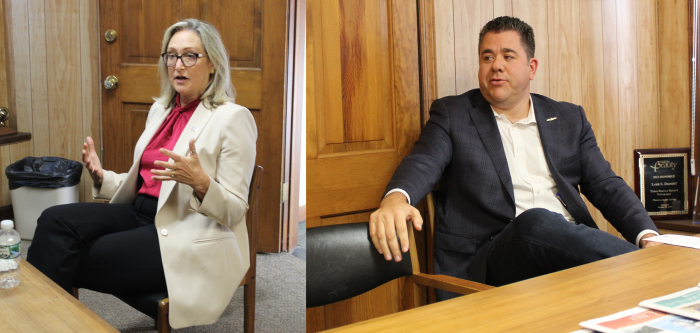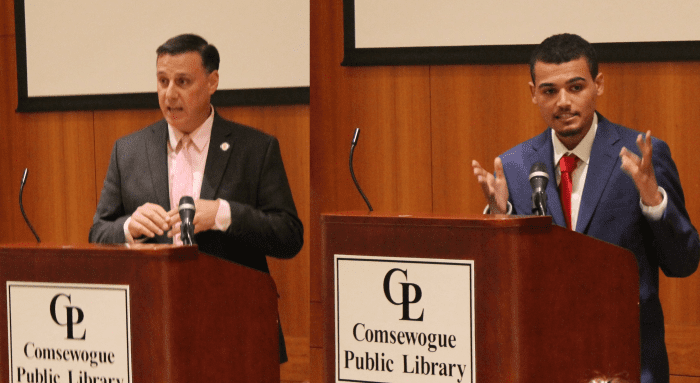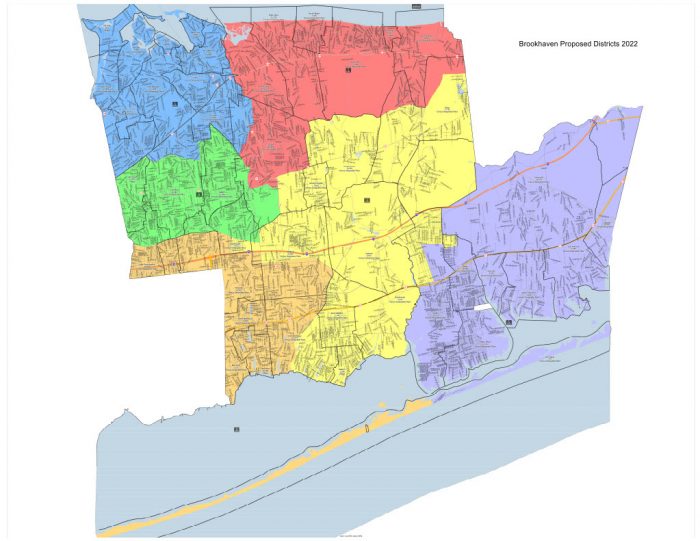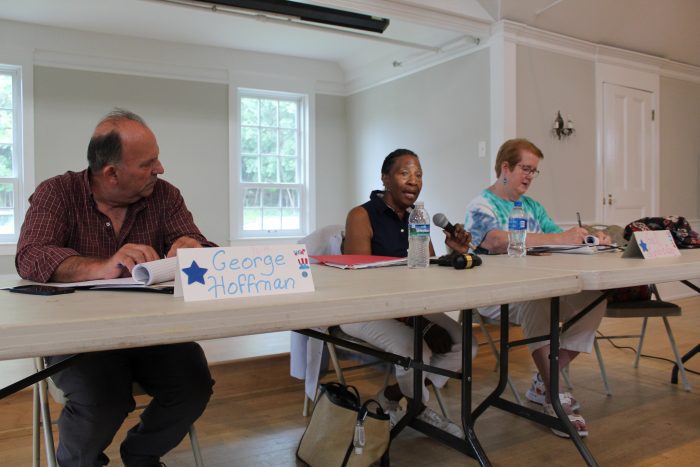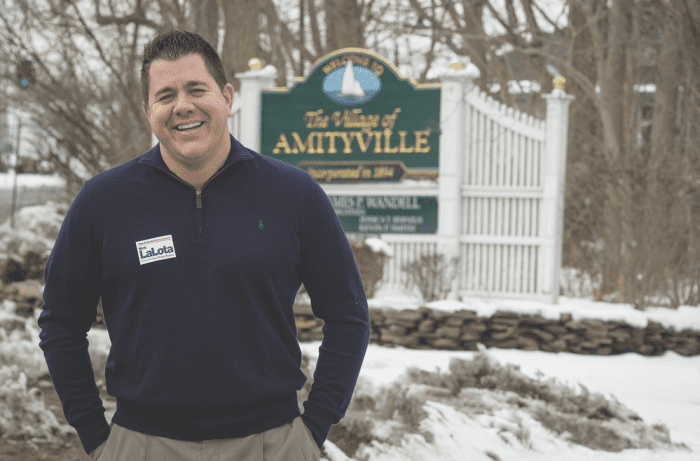The race to fill U.S. Rep. Lee Zeldin’s (R-NY1) congressional seat has highlighted some key issues confronting Suffolk County communities and the nation.
Zeldin announced last year he would vacate his seat to run for governor. Two major party candidates have emerged in his absence, both eager to fill the seat. In a debate with the TBR News Media staff spanning nearly two hours, the candidates covered myriad topics, tackling issues close to home and far away.
Introductions
Suffolk County Legislator Bridget Fleming (D-Noyac) is representing her party for the 1st District. She is a former criminal prosecutor, trying sex crimes and fraud cases. Over the last decade, Fleming has served in elective office, first on the Southampton Town Board and later in the county Legislature, where she is today.
Nick LaLota, of Amityville, carries the Republican Party nomination in this race. He served in the U.S. Navy for 11 years and deployed overseas three times. He worked in congressional and state Senate offices before being appointed as the Republican commissioner on the Suffolk County Board of Elections. Most recently, he was chief of staff for the county Legislature.
Outlining priorities
Through their time canvassing voters, the candidates identified their potential constituency’s core legislative priorities. LaLota said he had observed a mix of voter interest in the economy and public safety.
“A lot of folks with whom I speak are tremendously concerned about those two things,” he said. “People want the government to work for them. They expect to have a fair shot at the ability to earn and not have their money overtaxed … and they expect to go home at night and be safe.”
Fleming agreed that crime and economic concerns have piqued voter interest. However, she held that the overwhelming problem for those she has canvassed is declining faith in American democracy and the “protection of fundamental freedoms.”
“Protecting American democracy, that’s at the front of mind for lots and lots of people,” she said.
Abortion
LaLota maintains the U.S. Supreme Court’s recent Dobbs decision, which overturned Roe v. Wade and Planned Parenthood v. Casey, returned the matter of abortion to the states. While he does not view abortion as a federal policy concern, he nonetheless stated his position.‘ I would insist that government funds not be used for abortions, and I would also insist that … if a child is contemplating an abortion, that the parents get notified about that.’
—Nick LaLota
“I do not oppose abortion when it comes to rape, incest or the life of the mother, and I do not oppose abortion in the first trimester,” he said. “Conversely, I do oppose abortion in the second and third trimesters. I would insist that government funds not be used for abortions, and I would also insist that … if a child is contemplating an abortion, that the parents get notified about that.”
Fleming described abortion as a “critical issue that defines a moment in time in American history.”‘I believe firmly that it is not a state’s rights issue, that as a congressmember, I have to have a position on it, and that my position is that those protections [under Roe] need to be reinstated.’
—Bridget Fleming
“It’s the first time in the history of the United States that a federally recognized human right has been reversed,” she said. “I believe firmly that it is not a state’s rights issue, that as a congressmember, I have to have a position on it, and that my position is that those protections [under Roe] need to be reinstated.”
Economic apprehension
Amid rising inflation, higher food and gas prices, and nationwide economic hardship, both candidates were asked about their favored approach to relieving these financial woes.
Fleming acknowledged that voters in the 1st District are further constrained by the high cost of living in the area. “It’s hard to make ends meet on Long Island,” she said. “Those costs are rising. … We need to look for specific ways to attack those costs.”
She added, “Certainly, taxes are one of them. I’ve been fighting against the cap on our state and local tax deductions … I think it’s critically important that a representative of this district fights the SALT tax cap.”
LaLota contributes much of the nation’s economic distress to unsustainable federal spending. “The federal government hasn’t balanced the budget in 20 years,” he said. “I think that can and should be done in the next Congress.”
Concerning petroleum prices, LaLota proposes establishing national energy independence by tapping into domestic oil reserves.
“We have 43.8 billion barrels of proven oil reserves [as of the end of 2018],” he said. “That’s a 20-year supply, so there’s absolutely no reason to beg OPEC, Russia, Venezuela or anybody else to export their oil to this country.”
Energy and the environment
LaLota views the 20-year supply of domestic oil reserves as both a blessing and a curse. While it offers the U.S. flexibility in the near term, it provides no long-term guarantee for energy independence.
In the meantime, he supports an aggressive push toward renewable energy sources. “It is right for the private and public sectors to make investments in renewable, alternative energies — wind and solar, specifically — to ensure we are on a trajectory to be energy independent,” he said.
Establishing a clear point of difference, Fleming expressed vehement disagreement with LaLota’s position on drilling, calling it a “completely wrong direction to go.”
The county Legislator held up recent developments in the offshore wind industry, specifically at Smith Point Park, as a prototype for future energy development. She argued Long Island has an opportunity to be a leader in the cause for green energy.
“Not only will we be helping Long Island taxpayers, ratepayers and our natural environment, we’re also serving as a model for the region and for the United States on how we transition,” she said.
On the issue of nuclear energy, both nominees expressed a desire to keep nuclear power away from Long Island communities.
“I don’t think that the community would support it,” Fleming said. Referring to the decommissioned Shoreham Nuclear Power Plant, she added, “It’s been a huge detriment to any kind of progress.”
When questioned on nuclear energy, LaLota responded tersely, “Not on my Island.” For him, nuclear power is a matter of safety for Long Island residents.
“For safety reasons, putting a power plant on Long Island just doesn’t make any sense,” he said. “It didn’t make any sense decades ago and doesn’t make sense now.”
LIRR electrification
‘If you could bring in funding for the electrification of the rail once and for all, assisting the Long Island Rail Road to get that accomplished, I think you’d do an awful lot for the community.’
—Bridget Fleming
Fleming and LaLota both supported electrifying the Port Jefferson Branch line of the Long Island Rail Road. For both, electrifying the rail is a matter of directing public funds into Long Island communities but working in close coordination with local officials.
“We definitely need to electrify the rest of the line,” Fleming said. “If you could bring in funding for the electrification of the rail once and for all, assisting the Long Island Rail Road to get that accomplished, I think you’d do an awful lot for the community.”
LaLota concurred with this assessment while decrying the imbalance between the taxes New Yorkers give to the federal government and the infrastructure funds they get in return.‘When these infrastructure dollars are received from Washington, given back to the district, it should absolutely be done in conjunction with what local stakeholders want and need.’
—Nick LaLota
“We need to do a better job, working across party lines, to ensure that we get better infrastructure dollars back for projects like that,” he said, adding, “When these infrastructure dollars are received from Washington, given back to the district, it should absolutely be done in conjunction with what local stakeholders want and need.”
Foreign policy
On top of these domestic pressures, the congressional candidates identified critical instances of geopolitical turbulence in places around the globe.
Most notably, Russian president, Vladimir Putin, launched an invasion of Ukraine earlier this year, widely considered in violation of international human rights law. Fleming stressed her commitment to the Ukrainian war effort in response to Russian belligerence.
“I think it’s critically important for the rule of order and the international rule of law that the United States takes a strong stand, as we have, in conjunction with a united NATO, to condemn this unprovoked aggression, to offer military aid and to offer humanitarian aid,” she said.
On the whole, LaLota agreed with Fleming. He defined U.S. strategic interests in defending Ukraine. “We are the only superpower. We should promote stability throughout the world. We should protect American interests — we have many interests in Europe — and having stability in Europe … is good for America.”
Along with the war in Ukraine, they also discussed the dangers of a rising China, a regime exerting greater influence politically and economically around the world.‘I think we have lived in a moment in time for the last 10 years when China depends heavily upon U.S. dollars.’
—Nick LaLota
LaLota advocates loosening the economic links that bind the two nations, something he said is unnecessary and counterproductive.
“I think we have lived in a moment in time for the last 10 years when China depends heavily upon U.S. dollars,” he said. “We buy a lot of stuff — a lot of crappy, plastic stuff — that we shouldn’t have to buy from them.”
He added that American foreign policymakers must “ensure that [China] does not become a greater strategic enemy of ours.”
Fleming’s concerns regarding China relate primarily to Chinese president, Xi Jinping, whose unpredictable administration and questionable political associates cause her concern.‘I think we have to keep a very close eye [on Xi].’
—Bridget Fleming
“I think we have to keep a very close eye [on Xi],” the county Legislator said. “I agree that we need to put ourselves in an economic position where we’re not beholden to the Chinese regime.”
Closer to home, the United States is observing heightened instability within its own hemisphere, with volatile regimes in Venezuela and Cuba, and growing concerns surrounding the U.S.-Mexico border.
Both candidates were asked whether the United States must redefine its policy for Latin America.
For Fleming, much of the nation’s immigration crisis is attributed to government mismanagement of asylum seekers. “A lot of these folks are fleeing really dangerous circumstances,” she said. “One of the things we have to fix is a way to handle these asylum applications. We have huge backlogs in the court system, and a lot of it has to do with an unwillingness on the part of government to take seriously the granular issues involved in immigration.”
To remediate geopolitical unrest in the Western hemisphere, LaLota favors strengthening the military, diplomatic and economic bonds between the United States and its Latin American neighbors.
“In Congress, I would support ensuring that Americans are involved in South America,” he said. “I think the benefit is less illegal folks coming across our border, and less dependence upon the U.S. in decades to come.”
Congressional reform
‘We have moved away from encouraging thoughtful approaches to government.’
—Bridget Fleming
We suggested the Founding Fathers envisioned Congress as the most powerful and important branch of the federal government. Over time, however, the national legislature has delegated much of its authority to the executive branch, particularly the hundreds of agencies comprising the federal bureaucracy.
At the same time, recent Gallup polling indicates that three in four Americans disapprove of how Congress is handling its job. The two nominees delivered varied responses when asked how they would restore the central role of Congress in U.S. policymaking.
“I think that this quasi-rulemaking by executive branch agencies has gone too far,” LaLota said. “If there’s going to be a tax, a fee, a rule or anything in between, it should come from the legislature.”‘If there’s going to be a tax, a fee, a rule or anything in between, it should come from the legislature.’
—Nick LaLota
Expanding upon this stance, he criticized the existing culture of pork barreling and logrolling in Washington. He also advocated shorter, more straightforward, germane legislation narrowly tailored to the issues at hand.
“We shouldn’t be sticking all of this pork and these other ideas into [a bill] that has a different title,” he said, adding, “If we got back to that norm, I think we give power back to the people.”
Fleming’s frustrations with Congress stem from the breakdown of informed discourse and norms of civility. To reform the institution, she proposed the reinstatement of these practices.
“We have moved away from encouraging thoughtful approaches to government and are instead so prone to responding to, almost, performance art on the part of politicians and legislators,” she said.
To get the national legislature back on track, the county Legislator emphasized constituent services and a community-centric method of policymaking.
Referring to the Constitutional Convention of 1787, she said:
“I think of Philadelphia when representatives came on horseback from their various places and asked that the government be shaped in a way that would respond to the concerns of folks in their communities,” adding, “That’s the model of government that I’ve always undertaken and that I think works best.”
The people of the 1st District will get the final say on these candidates on Tuesday, Nov. 8.

